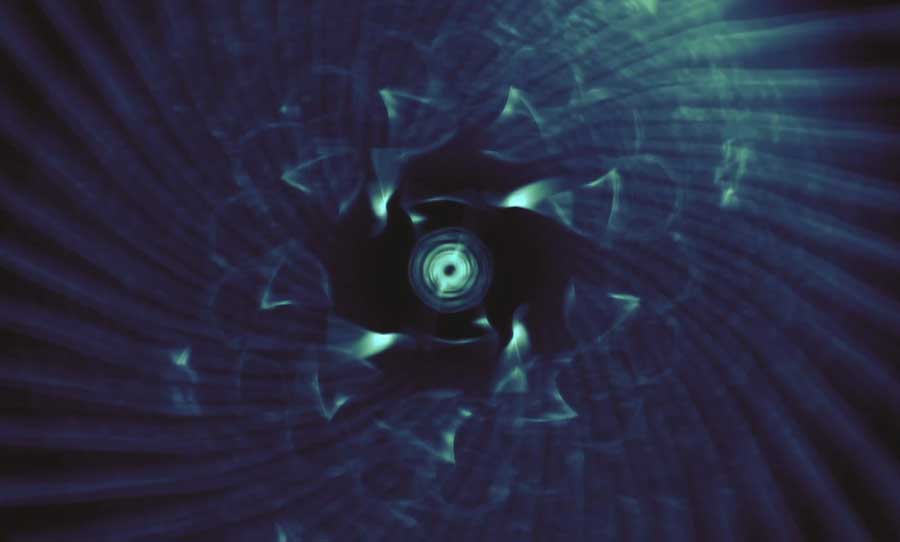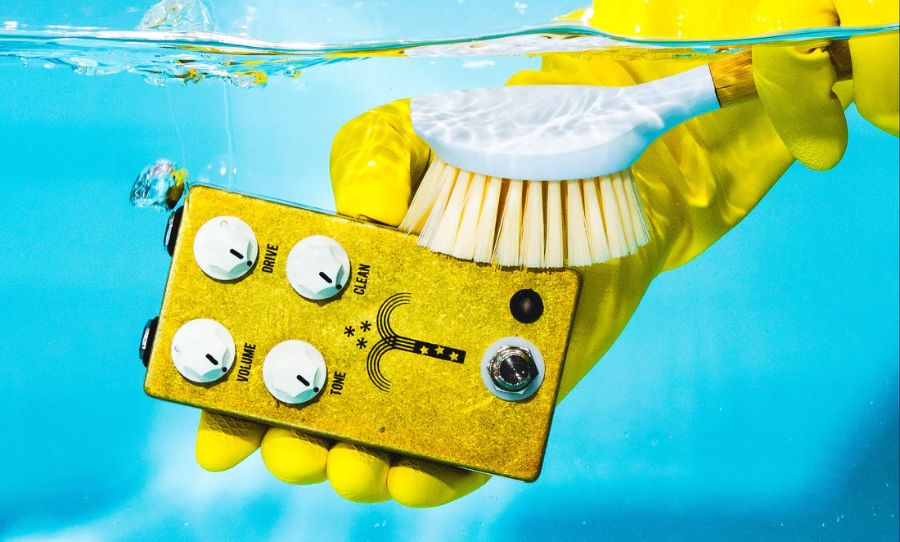Soundself: A Technodelic is a video game that supposedly makes you feel like you’re tripping on magic mushrooms or LSD.
“After just a 15-minute experience with Soundself, people were reporting a unitive experience of consciousness with the same regularity that you’d get with a magic mushrooms trip.”
That’s Robin Arnott, the creator of a new video game named Soundself: A Technodelic. Calling it a video game might be a little derivative, actually, Arnott would prefer you call it a “transformative gaming experience” – a suitable enough title for an idea that came to him one year at Burning Man.
This article appears in print in Happy Mag Issue 15. Grab your copy here.

History has seen its fair share of trippy video game moments, accidental or otherwise. Descending into the Lovecraftian horror of latter-half Bloodborne, accidentally inhaling half a hemp field in Far Cry 3, or experiencing game-coded psychosis in Hellblade: Senua’s Sacrifice are all moments made to disorientate or flat-out freak out the player, but what Soundself does is a little different.
After checking that your microphone works, the game starts you at the base of tree, looking upward to a night sky. You’re then invited to begin breathing, concentrating on the stillness of your body and the gaps between your breaths. To rise up the tree, you must sing out in long, constant tones; ‘ohhmmm.’ And when you reach its canopy, the world explodes into a neon-coloured, swirling landscape of fractals, spirals, and sound.
Every noise you make, picked up via your microphone, is fed back to you with differing levels of distortion. Where other games – for example voice-controlled Kinect commands in Mass Effect 3 or movement recognition in Just Dance – have tried to embrace the whole body as a sort of controller, none have really made the integration seamless. That’s what Soundself attempts, as Arnott tells us.
“…you look at most games you play and you’re using your fingers. You’re either using a keyboard and mouse or a joystick or something, which means that the game is only really interfacing with your sense of agency, with that which you’re trying to do. But it’s not listening to your heart, it’s not listening to your breath, it’s not getting to know you intimately, it’s getting to know you on a very mental level.
“As a result, most games wind up being pretty disembodying. You’re not playing it with your whole body, you’re not wholly in it, you’re projecting an identity into it and you’re experiencing a kind of disembodied fantasy.”
“How do I, instead of having a person’s attention going outward, how do I draw their attention back inward? How do I give them something to do, but while I’m doing that, nourish something deep within them? And we can use game design principles to give people really powerful transformative experiences, but they’re not… I think when we see the purpose of our gaming as an escape, that really limits how much of ourselves we can bring into the experience.”
The game draws its design principles from meditation and ceremony – and quite obviously, psychedelic experiences such as those brought on by LSD or magic mushrooms. Soundself is more like a guided meditation than any conventional video game, although the only actual guidance comes at the start and end of each session.
Soundself’s creator is an experimental game designer who has been a longstanding speaker for mindfulness in games. In Arnott’s words, his “whole career has been looking at meditation and ceremony and mysticism through the lens of video games.”
Which isn’t an especially difficult connection to make; both gaming and meditation rely on a voluntary disconnection from the outside world and the immersion in an inner world, whether that’s within yourself or written into a CD. To Arnott, the two practices are closer than most people realise.
“A meditation is a game; if you’re doing a breath meditation, you’re playing a game. The game is ‘I’m going to bring my attention back to my breath when I notice my attention deviating.’ And when you play that game, it has the psychological effect – just like if you play God of War or something like that – it’ll have the psychological effect of increasing your cortisol levels and getting you amped up and excited.”
“You’ll have these bouts of tension, release, tension, release, which can be pretty emotionally satisfying, sure, but there’s certain predictable effects from playing a game like that. When you play a game of meditation, it has a certain predictable effect, which is that it’s going to disengage your mental narrative, it’s going to help you witness yourself, and it’s going to drop you into a state of stillness.”
The idea for Soundself came to Arnott while he was mid-LSD trip at Burning Man; the annual Black Rock City festival known for its wild ideas and wilder inhabitants. Like most realisations that burn into one’s mind during a psychedelic experience, it took some time to blossom thereafter:
“I had my first oneness experience at Burning Man and it just… it didn’t leave me untouched, it didn’t leave me the same. And a few months later, when I was remembering that experience, I had the insight that video games are very powerful, they’re very trance-inducing, they bring us to places – especially with the advent of virtual reality – they can teleport us, they can evoke incredible emotion in us.”
“And I had this insight that a video game could do for a person what meditation does, and do for a person what psychedelics do – without needing to take the risk of taking psychedelics or without having to practice the discipline of meditation – because a game could provide the interactive context that could lull your mind into a trance state.”
For a video game to do what psychedelics can accomplish is a bold goal. Substances such as psilocybin, LSD, or DMT are repeatedly cited as being responsible for some of the most emotionally significant and spiritual experiences of users’ lives. To climb that mountain in 15 minutes, at face value, seems impossible.
When I played Soundself, I chose a 20-minute session. The gameplay footage above doesn’t quite do the immersive nature of the experience justice – you do lose yourself within the halls of sound and colour; a hyper-digitised feedback loop that that invites you in and doesn’t let go.
The experience was deeply relaxing and I’ll definitely be back for another session, but it didn’t boast the same arresting power as certain chemicals have for me in the past. That said, I was a sample size of one, and research conducted by the game’s creator has shown that yes, this game can take you to the same places magic mushrooms can.
“I just had to do the research and so we started working with Dr. Jeff Tarrant, who’s a real expert on EEG and meditation and he knows the signatures of those transcendent states like anyone. It was just a small study… and what we found were really remarkable brainwave patterns, we found a big increase in high gamma which is one of the signatures of a psychedelic experience.”
“But also from the subjective questionnaires we found that people report unitive states of consciousness with – and this is after just a 15-minute experience with Soundself – people were reporting a unitive experience of consciousness with the same regularity that you’d get with a psilocybin trip.”
Whether or not you’ve experienced psychedelic substances, Soundself is a game aimed at you. It’s an excellent introduction to meditation for those who’ve long wanted to dip into that world, and its delivery in the video game format means it’ll likely inform a new audience to the benefits of these practices.
And hey, it might take you into an altered state that was previously only accessible through meditation training or eating up some magic mushrooms. The only way to find out is to turn on, tune in, drop out to Soundself: A Technodelic yourself.
This article appears in print in Happy Mag Issue 15. Grab your copy here.
Soundself: A Technodelic out now on PC, MAC and PC VR via Steam.



